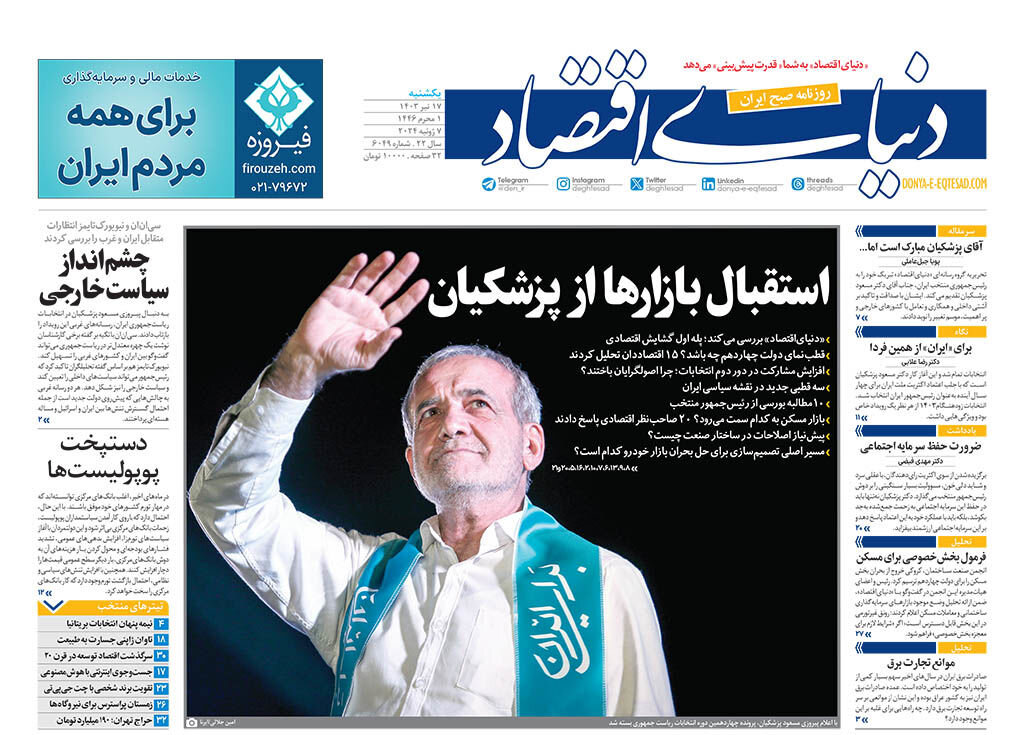The first step is economic opening

TEHRAN - In an analysis, Donya-e-Eqtesad investigated the main priority of the new president, Masoud Pezeshkian, and wrote: Sanctions as one of the most important effective factors on Iran's economy, especially in the last decade, have had extensive effects on all aspects of the country's economy.
These effects were not only limited to the reduction of oil revenues and the increase of business costs but have also penetrated deep into the economic structures of the country and led to the intensification of many existing problems. Considering the wide and deep effects of sanctions on Iran's economy, the lifting of sanctions should be placed as the first economic priority of the country. The limited and temporary lifting of sanctions cannot solve the main problems and uncertainty continues to cast a shadow on the country's economy. Therefore, it is necessary to take steps towards the permanent removal of sanctions in order to completely reduce their negative effects and achieve sustainable development. Lifting sanctions can help improve macroeconomic indicators such as reducing inflation, increasing government revenues, and reducing budget deficits, and can lead to increasing public confidence and improving people's living conditions.
Ham Mihan: The foreign policy challenge of the 14th government
In an article, Ham Mihan dealt with Iran's nuclear strategy and the options for the United States of America and its allies. The paper said: Upon the failure of negotiation between Iran and the JCPOA member countries, the issue of the nuclear program has become the main challenge of Iran's foreign policy. Considering the course of political developments in America, the region, and the international system, it is possible to see the possibility of escalation of tensions over the nuclear program in the months after the presidential elections in Iran and the United States. The 14th government should be well aware of the fact that the possibility of reviving the JCPOA as it was done in 2015 is largely impossible. Any diplomatic effort to remove nuclear sanctions and solve the challenge in this field requires awareness of the fact that the talks to deal with Iran's nuclear program will be conducted with an understanding of the new conditions. In addition to proposing new demands, the negotiating countries will make more efforts to impose economic, political, and even military threats.
Kayhan: The priority of foreign policy is the neighbors
In a note, Kayhan pointed out the congratulations of many countries for the election of Mr. Masoud Pezeshkian as the new president of Iran. It wrote: Despite the congratulations of many countries, some Western governments, especially the United States, not only refused to congratulate, but even the American government several times, questioned Iran's elections. America supported mercenary groups such as monarchists, terrorists, and separatist groups who were tasked with boycotting the elections. Now, more clearly than ever, it can be seen that the priority of our foreign policy and commercial diplomacy is not the United States and some disloyal European governments, but the neighbors and important economic and political partners in Asia, as well as Latin America and Africa. Our country is located in the heart of West Asia at the crossroads of communication between East and West and South and North of the region and has a high capacity for global trade and transit. Our strategic priority is constructive and intellectual interaction with honor, wisdom, and interest with these countries in the region, especially economic powers. After that, it will be the turn of the belligerent and arrogant West to decide whether they want to engage respectfully and return to their broken commitments or not.
Shargh: The new season of diplomacy
In a conversation with Heshmatollah Falahat Pisheh, a senior analyst of international issues, Shargh discussed the program and foreign policy strategies of the 14th government and said: For the 14th government to be able to make the current positive trend in the market and economy stable, it should pay more attention to the foreign policy field. Two basic steps must be taken by the Pezeshkian government. The first step is to strengthen popular support to increase the power of diplomatic bargaining in order to strengthen the power of Iran's foreign policy through synergy. In the second step, this government should send positive messages to regional and extra-regional actors from a position of power. Therefore, America and Europe have to not miss the opportunity to de-escalate the tension with the Pezeshkian government. This issue can create a positive basis for the country's domestic atmosphere. In the situation where the tension between Tehran and the IAEA has become stronger, de-escalation activities and more cooperation with the IAEA should be on the agenda in the coming months, because the issue of activating the trigger mechanism and referring Iran's nuclear case to the Security Council is on the agenda.
Leave a Comment